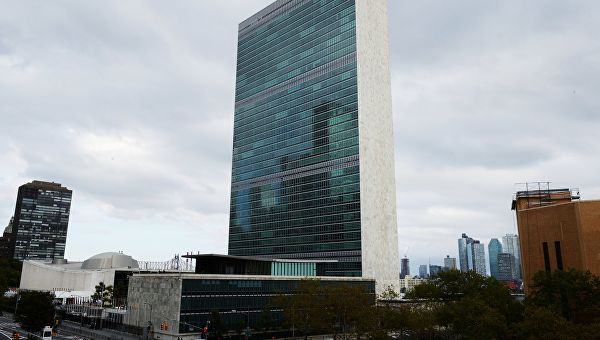Statement by Representative of the Russian Federation Andrei Belousov in the First Committee of the 74th session of the UNGA on Cluster 6 “Regional Disarmament and Security”
Ladies and gentlemen,
The military and political situation in the world continues to deteriorate. We are particularly concerned about what is happening in Europe in this regard. The official anti-Russian politics of the North Atlantic Alliance "erodes" the original foundation on which European regimes and security instruments were built and functioned.
Indeed, thousands of NATO servicemen appear on a so-called "continuous rotational basis" where they have never been - near the Russian borders. The logistical capabilities of European countries are being rebuilt to accommodate even larger deployments. The scale and intensity of exercises with clearly provocative scenarios, including those involving the use of nuclear weapons, have increased. The expansion of the bloc in the Balkans continues. Once militarily stable regions of Northern Europe and the Baltic States are increasingly resembling frontline zones. NATO's military activity in the Black Sea region is expanding. New joint (multi-service) forces have been growing in number to project power.
We believe it is necessary to use all opportunities to reduce tension and enhance cooperation.
At a time when the Treaty on Conventional Arms in Europe is no longer viable, the importance of confidence- and security-building measures not only remains, but also becomes extremely important.
We are aware of the particular significance of the implementation of the Vienna Document 2011 (VD-2011) for European security. Acting in good faith, we intend to continue to inform the participating States about the conduct of unannounced dawn raids and exercises and to invite military attachés of foreign States to attend them as observers.
We confirm our negative attitude to the idea of modernization of the Vienna Document. In the context of confrontation and NATO's policy of "deterring" Russia, even a technical reissue makes no sense. The decisions of the OSCE Forum for Security Co-operation adopted over the past five years have been implemented since their publication. It is not deterrence that is needed to strengthen security, but restraint.
We welcome the resumption of full implementation of the Treaty on Open Skies this year. The continuation of the "no-fly period" could lead to increased mutual distrust and political military tension. We expect Georgia to implement faithfully the Treaty on Open Skies.
We consider "Structured dialogue" on security challenges in Europe as an important confidence-building measure aimed at de-escalating military tensions and reducing the threat. The past meetings were, in our view, useful. The thematic focus of the discussions in general concerns issues that should be given priority attention. First of all, it involves de-escalation, military disengagement, restoration of military-to-military relationship. Suggestions, which require further analysis, were made. This applies in particular to the ideas for developing a code of conduct on transparency, risk reduction, prevention and resolution of military incidents. We will continue our participation in this format.
We support the OSCE's role in promoting conflict resolution. For our part, we will continue to facilitate their resolution in Donbas, Transdniestria and Nagorno-Karabakh. I would like to stress that Russia is not a party to any conflicts in the OSCE area or in the world.
On the whole, it should be noted that, given the current trust deficit, no significant progress can be expected in the field of conventional arms control in Europe.
The consolidation of the positions of confrontation with our country by the United States, NATO and the European Union, unprecedented for the new time political and economic pressure on Russia, and the breakdown of military to military cooperation – all of this runs counter to the OSCE's guidelines for the formation of an all-European security space.
To reverse this dangerous trend is a common task for all interested States.
Russia is ready to work constructively in this area on the basis of the principles of equality, mutual respect and consideration of each other's legitimate security interests.
